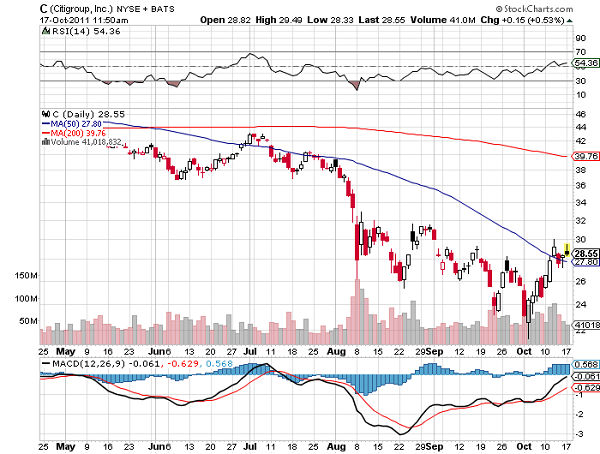Now may be the time for long-term investors to consider a play on the United States third largest financial institution, Citigroup, which posted higher third-quarter earnings Monday, as less money was set aside to cover bad loans, and the bank recorded an accounting gain allowed to banks in volatile markets.
The bank reported a net income of $33.7 billion ($1.23 per share), versus $2.17 billion ($0.72 per share) in the same quarter last year. These results include a pre-tax gain of $1.9 billion ($0.39 per share) after taxes, as a result of the financial institution’s widening credit spreads during the quarter.
At the height of the US financial crisis, Citigroup received three United States government rescues, but is now seeing its problem loan portfolio shrink. The bank also saw nonaccrual loans fall from $12.46 billion last year to $7.95 billion.

Citigroup Stock Chart
Since shares in Citigroup underwent a 1-for-10 reverse split on May 6th, the stock has declined by 35%, with a 23% decline in the KBW Bank Index for the same time frame. The largest US banks have seen their earnings and revenue estimates cut by analysts, who are projecting dramatic declines in capital markets revenue and third-quarter trading, as well as lower income from fees due to the Consumer Protection Act and Dodd-Frank Wall Street Reform.
Citigroup could prove to be a considerably less risky play than similarly valued Bank of America, a bank which still faces an uncertain ride through the remainder of the mortgage debacle. This could mean that now is a golden opportunity to either initiate a new long position in Citi’s shares, or add to an existing long position.
Citigroup’s Building Capital And International Story Could Make It A Long-Term Winner
Citigroup is showing the industry’s biggest improvements in capital levels among the largest bank holding companies in the United States, as its Basel I Tier 1 common equity ratio more than doubled to 11.7% in June from 2009.
Following the Basel Committee announcement concerning the enhanced capital requirement for the largest financial institutions in June, Citigroup could pay a “modest” $2 billion in dividends and $4 billion in common stock buybacks in 2012 and still meet the 2.5% buffer by the end of 2013, which is well in front of the deadline of 2019.
Citigroup’s revenue from consumer banking in markets that are outside North America during the second quarter totaled 59% of total revenue in the Regional Consumer Banking unit, or $4.8 billion, an increase of 12% from last year.
As the markets continue to remain volatile, with the US attempting to drive economic growth, and Europe tries to solve its financial crisis, long-term growth opportunities have presented themselves in Latin America and Asia, two regions where Citigroup has an growing presence with consumers.
Analysts Point To Possible 51% Upside For Citigroup Shares
Analysts covering Citigroup point to a possible 51% upside for the bank shares, with a consensus price target of $60.33. Sixteen out of twenty-two analysts currently rate Citigroup a “buy”, with four analysts rating it a “hold” and two a “sell”.
Citigroup is enjoying a favorable position with analysts due to its earnings stability, business diversity, and capital position. While many of its competitors are in a position of having to contemplate shrinking overseas, Citigroup is expected to maintain a focused on growing emerging-markets operations, and could be poised for gaining market share.
The coming weeks and months will surely bring more volatility to global markets, and Citigroup will not be immune from the wild market swings that have become all too common. For long-term investors, however, this may be the time to consider a long position in Citigroup for your investment portfolio.
Comments (No)